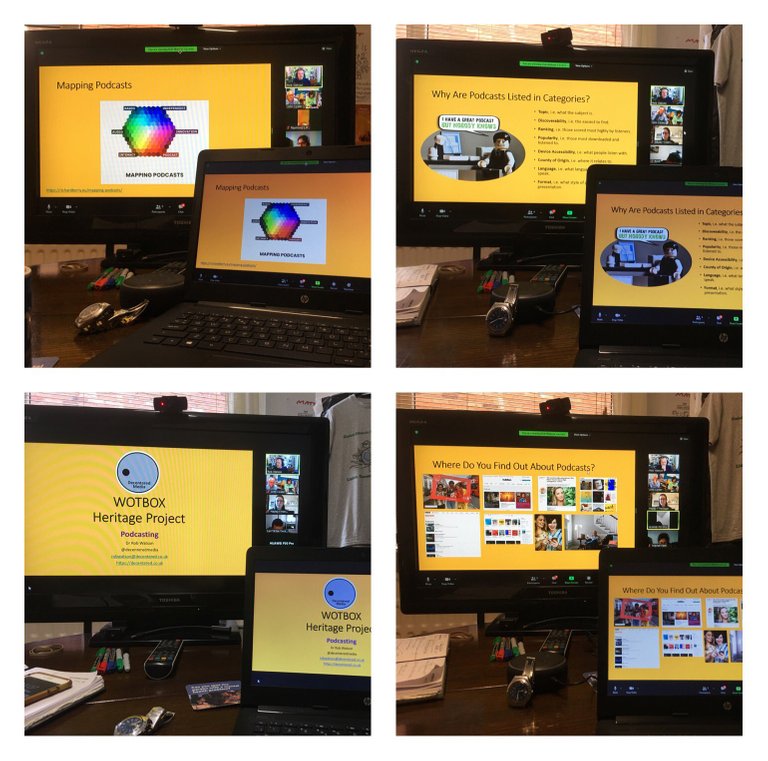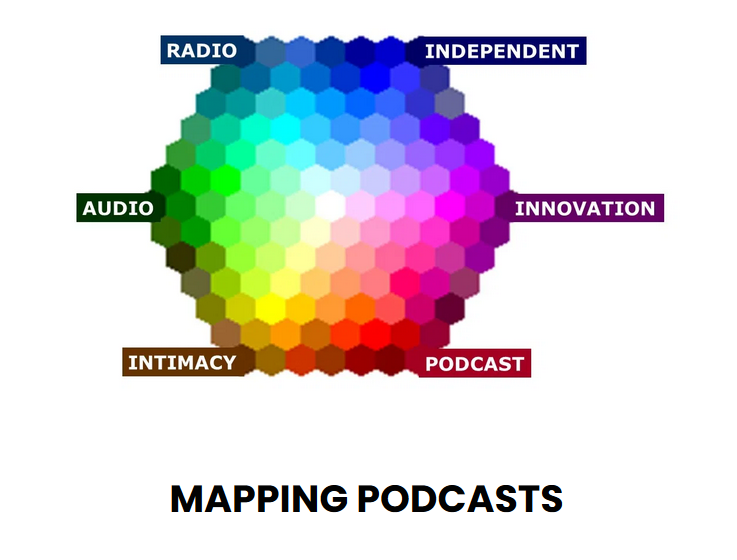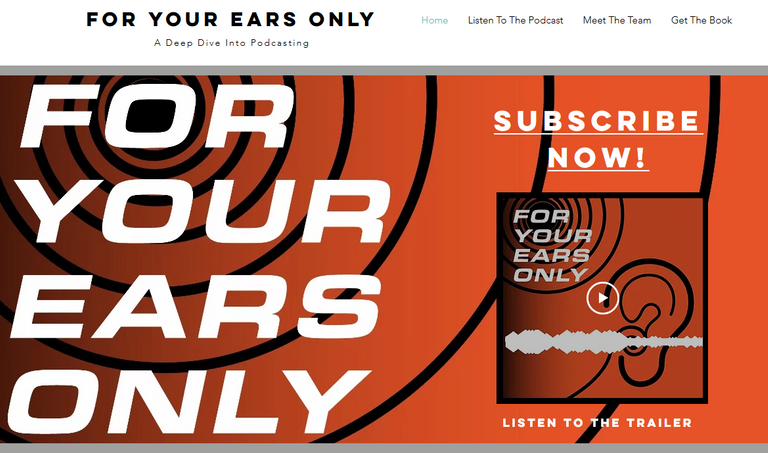
Yesterday I delivered an online training session about podcasting for the WOTBOX Heritage Project. It was really nice to be able to spend time with a group of young people who are keen to learn about and create their own podcasts.
There were a couple of key points that I concentrated on in the session, which I felt would help them understand why podcasts are different, and why they are an essential form of DIY and community media. I wanted to make the essential point that people are motivated by many reasons for making podcasts, and that we can make them in ways that suit our own needs, rather than having to fit in with a pre-determined format.
In the first section of the session I started by identifying the range of podcasts that are available, and where they can be found. Then we did some thinking about the different format and genres that podcasts are shaped and influenced by. I used Richard Berry’s description to get them thinking about the different ways that we use podcasts, and who they cater for.
As Richard describes in his blog:
“Podcasts are an intimate form of media. We listen on headphones to work often produced in the home on subjects that often talk to our inner selves. They do not need to cater to a mass audience and can feel very personal. It is this niche positioning that again marks out podcasts from radio. If you want to stand out in podcasting, then my advice is to innovate and do something different and again podcasting has been able to do this again and again. With a sense of intimacy also comes informality, a sense by which hosts just chat to you (or each other) and you don’t feel the pressures of time limiting a conversation, nor the sense by which environments change our behaviours.”

Richard's Map of Podcasting
Richard identifies five elements that make podcasts different than, for example, radio programmes. He points out that podcasts are an intimate medium because we are often listening while wearing headphones. The ease by which podcasts can now be updated on our smartphones makes podcasts a more accessible mass media. There’s nothing complicated about subscribing and updating to the latest episodes anymore. The apps on our phones are able to keep us updated.
- Intimacy
- Innovation
- Informality
- Independence
- (Dis) Intermediation
But this innovation comes at a cost, some might say a negative cost, but many might say it’s a more positive price to pay, which is the loss of professional presentation styles that dominated broadcast radio programmes. Podcasts are more likely to be informal, with open styles of engagement and less focus on specific times and structures. The freedom that podcast creators have to experiment and to be themselves, rather than putting on a persona or personality, is refreshing form many people, and it signals that podcasts are a more authentic form of media.
This authenticity is combined with an enhanced sense of independence. Even the BBC is promoting it’s podcasts as an independent adjunct to it’s main broadcast services. Podcasts are being given more latitude to experiment with different sets of social values, and different attitudes to issues that have the potential to be at odds with more traditional models of programming that is produced for the broadcast stations.
Finally, Richard recognises that podcast are a form of trans-media that are interlinked, parallel to, and emerge from other forms of media. The rise of the gaming podcast, for example, where we can listen to the conversations that gamers have during their play-sessions are now quite common. Is this audio commentary and conversation a podcast? Well it engages listeners is an aural conversation so perhaps we can put the podcast label on them with some confidence.

Podcasts About Podcasts
Now that we’ve established a map of the forms of podcasting, the next step is to think about why people make and listen to podcasts. Podcasts are going to studied for a long time to come, as the form emerges, and patterns evolve. Listen to the excellent ‘For Your Ears Only Podcast’ if you want to find out more about podcasting and what has driven the development that shape the formats and the practices associated with podcasting.
An important question that gets asked considered, in addition to thinking about the range of formats of podcasts, is the motivations that people have for listening to them. Because podcasts have rapidly emerged from a period of intense technical and social communications change, we’ve not had a lot of time yet, to figure out what the reasons are that people listen to podcast, and what the reasons are that people make them.
For example, podcasts help people to access information, companionship and entertainment that they don’t get from other platforms. Is this because podcasts have evolved to be more accessible via smartphones, or is it an indication that people are ready for more diverse forms of discussion? Would the technological change happen if the people were not receptive to widening the scope of their personal media ecosystems? Which way around do we need to get this? Is the cart before the horse?
This is why I believe it is important to think about what motivates people to make, share and listen to podcasts. People use media to help them with all sorts of issues and needs. These needs and interests aren’t fixed, but change over time. In order for a new media system to become established in our culture, even if only temporarily, then they have to be relevant to the life-needs of different people who create and use them.
I would suggest that one of the primary reasons for people making and listing to podcasts is because they add to a sense of belonging and community that we don’t get elsewhere. We live in a society where it is difficult to discuss some topics with our neighbours, but if we listen to a podcast, we might find that we are able to identify with a tribe who share similar experience and concerns.
Here’s a couple of reasons that we might say that people are motivated by when making and listening to podcasts:
- Escapism - entertainment and fantasy.
- Engagement - discussion about personal and social issues.
- Awareness - information about politics and current affairs.
- Fandom - belonging sport and popular culture.
- Identity - information about minority culture.
- Innovation - information about computing and technology.
- Improvement - information about healthcare and wellbeing.
- Collaboration - shared experiences.
- Learning – educational and study.
- Participation – DIY and people sharing their own content.
- Connection – being up to date and ‘in-the-know.’
It would be regressive to try to fix the reasoning and the motivation of podcasters and listeners into one of these categories. They interact across all of them. Often, we can get more understanding and learning about current events from a comedy podcast than we can from a lecture or news discussion. We just need to be open to the value of different approaches.
My recommendation to the young people I was discussing this with, was to not let anyone tell you that there are fixed rules about podcasting. There aren’t. There are many reasons and formats that we can experiment with, and because podcasting can be relatively cheap to do, then we can expect more forms and practices to emerge as we get the opportunity to be creative with our podcasting.
Posted from my blog with SteemPress : https://decentered.co.uk/whats-the-motivation-for-podcasting/
Congratulations @decentered-media! You have completed the following achievement on the Hive blockchain and have been rewarded with new badge(s) :
You can view your badges on your board and compare yourself to others in the Ranking
If you no longer want to receive notifications, reply to this comment with the word
STOP